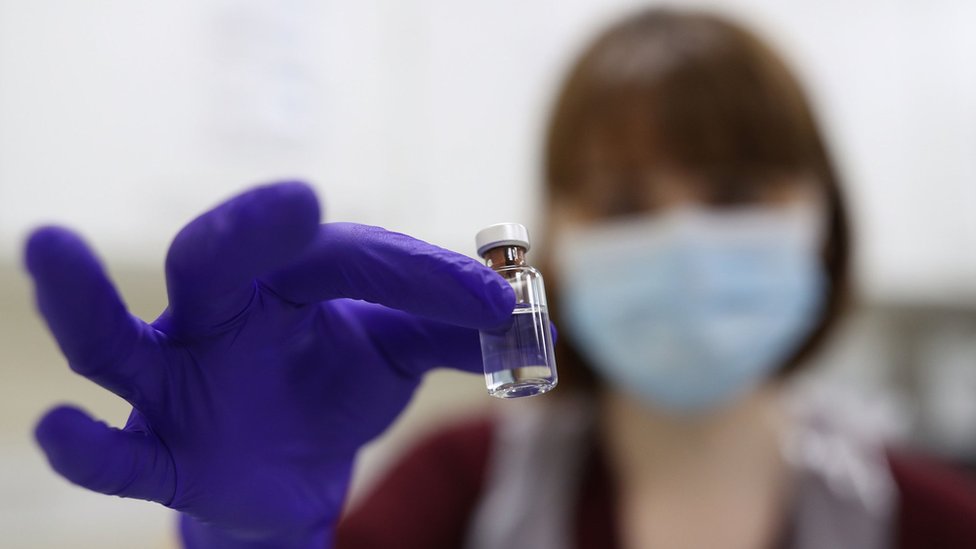Covid vaccine: What you need to know about vaccine safety
Covid vaccine: What you need to know about vaccine safety
By James Gallagher
Health and science correspondent
In any conversation about vaccine safety, there is one statistic worth holding on to: one in 1,000.
One in 1,000 people in the UK have already died after being infected with coronavirus during the pandemic. This is the known threat from the disease that any risks have to be balanced against.
In medicine there is an important difference between "safe" and "harmless" and between "risk" and something being "risky".
And two people who were given the Pfizer vaccine had allergic reactions. So, what do we mean when we talk about Covid vaccines being "safe" to use?
"If you mean absolutely no adverse effect, then no vaccine is 'safe' and no drug is 'safe'. Every effective medicine has unwanted effects" says Prof Stephen Evans, from the London School of Hygiene & Tropical Medicine.
"What I mean by safe is the balance of unwanted effects compared with the benefit is very clearly in favour of the benefit."
The UK's medicines regulator, the MHRA, has decided the Pfizer/BioNTech vaccine has met that standard.
The bar is set really high for vaccines
There are some drugs that have truly brutal consequences on the body, but are still approved because they are considered worth the risk.
Chemotherapy drugs have a huge list of damaging effects include exhaustion, hair loss, anaemia, infertility, memory and sleep problems. Yet when those are pitted against dying from terminal cancer, nobody questions the drugs being used.
Others can have severe side-effects which are incredibly rare. The painkiller ibuprofen, which nearly all of us have at home and would take without thinking, can cause bleeding and holes to form in your stomach and intestines, difficulty breathing and kidney damage.
The risks are there, but they are far outweighed by the benefits.
"Safe is not an absolute thing, it is safe in the context of the usage," Prof Evans told the BBC.
The key difference with vaccines is they are given to healthy people and that massively shifts the balance. Any risk has to be incredibly small.
A 10,000-page decision
Regulators make the assessment based on far more data than has been made publicly available, much of which has been in the form of press releases.
There will be nowhere to hide - if there are safety concerns then the regulators will see them.
Companies have to hand over data from laboratory studies, animal studies, the phase one safety trials, the phase two dosing trials and the large phase three "does it work?" trials.
"It will amount to at least 10,000 pages of information," said Prof Evans.
The Pfizer vaccine cuts cases of Covid by about 95%, but it does have very common side-effects including pain from the injection, headache, chills and muscle pain. These could affect more than one in 10 people.
These are all symptoms of the immune system kicking into gear and can be managed with paracetamol.
"The MHRA are very experienced, we can be reassured if the regulator says the benefits clearly outweigh the risks, that should be the end of it really," says Dr Penny Ward, from King's College London and the Faculty of Pharmaceutical Medicine.
Rarer problems
It is always possible that vaccines have health consequences that have not yet become clear.
There is data on about 20,000 people who were immunised in the Pfizer trial, 15,000 for the Moderna vaccine and 10,000 for the one developed by Oxford/AstraZeneca.
That is enough to show the vaccines works and to detect common problems. But they may not pick up something that affects one-in-50,000 people who are immunised.
"You can't always spot them before you license without a trial of millions of people if the side-effect is vanishingly rare," says Dr Ward.
But this is true for every vaccine that gets approved. It is not a unique or new issue with the Covid jabs.
The seasonal flu jab has been linked to about a one-in-a-million chance of the nerve disorder Guillain-Barre syndrome, although even more cases are caused by the flu virus itself. And about one in 900,000 people have severe allergic reactions, known as anaphylaxis, to a vaccine.
"Not many of us think twice about driving somewhere, but the risk of a car accident is a lot higher than serious effects of a vaccine," says Dr Ward



Comments
Post a Comment